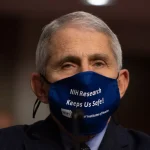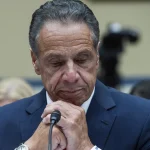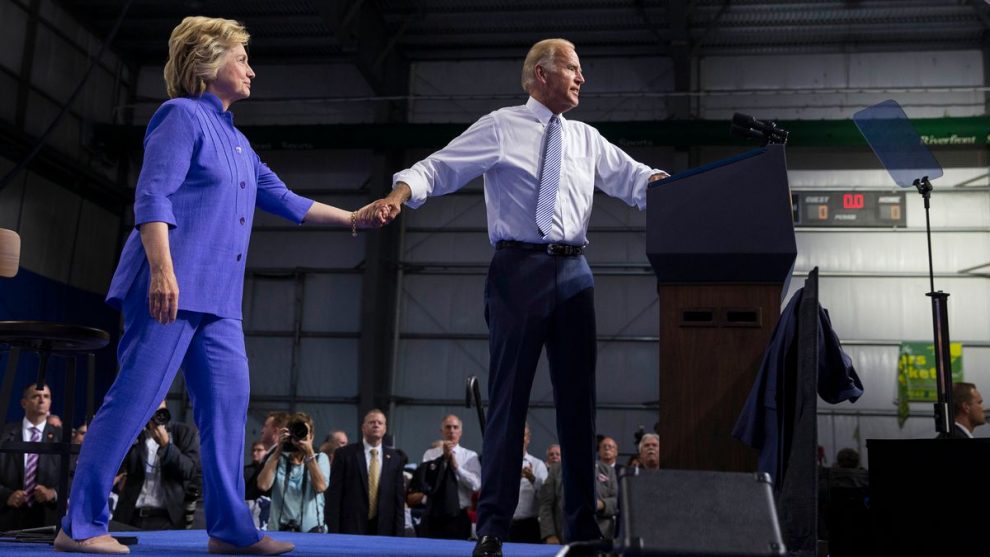Democratic presidential nominee Joe Biden’s polling lead over President Trump is holding steady in a significant shift from 2016, when Democrat Hillary Clinton saw her lead fall in the week before Election Day.
All of the factors that pollsters measure to analyze volatility among likely voters — the number of undecideds, those considering third-party candidates and leaners who could still change their minds — are down at this point in 2020 compared to in 2016, keeping the race at a steady level that favors Biden in the home stretch.
Nearly 60 million people have already voted, and the pool of undecided voters is dwindling. And while the polls have not fully digested last week’s debate, which seemed to be a net positive for Trump, it seems unlikely it will be a late game-changer.
“We just haven’t seen a lot of movement,” said Monmouth University pollster Patrick Murray. “Every now and then you’ll see it jump around a bit, but that’s all in a normal range and due to differences in polling, rather than real movement. We’re measuring less volatility in the electorate than at this time four years ago, when we saw the gap between the candidates closing. That’s just not happening this time around.”
At this point in 2016, the polls had begun to tighten significantly, even if many analysts ignored it.
There are a number of differences between 2016 and 2020, most notably the coronavirus pandemic, which is the defining issue of the campaign.
One of the turning points in 2016 came just 11 days before Election Day when former FBI Director James Comey announced he was reopening an investigation into Clinton. Democrats blamed Comey for Clinton’s loss.
In contrast, a majority of the voters who broke late for Trump in 2016 — independents, suburban women and seniors — are telling pollsters they support Biden in 2020.
Critically, the Democratic nominee has surpassed the 50 percent mark in recent national and battleground surveys, while Trump remains mired in the low to mid-40s. Clinton was below the 50 percent mark in all but two national polls released in November of 2016, while Biden is at 51 percent support in the RealClearPolitics (RCP) average.
In 2016, voters who disliked both candidates broke for Trump.
Biden is far more popular than Clinton, and voters who dislike both major-party candidates in 2020 are telling pollsters they’ll vote for the Democrat.
The Trump campaign’s Hail Mary was to kick up dirt around a story about Hunter Biden’s business dealings, but that has largely fizzled due to questions about the integrity of the source material and media disinterest.
Joe Biden’s national polling lead over Trump has shrunk to a degree, but not to the extent that Clinton’s did, and it still leaves Biden with a solid advantage.
Biden leads by 8 points in the RCP national average, down from 10 points a few weeks ago. One week out in 2016, Clinton led by 2 points in the RCP average, down from 5.5 points in mid-October.
In the FiveThirtyEight model, Biden leads by 9.2 points nationally, down from 10.5 in recent weeks but above where he’s been for most of the cycle.
A new national survey from IBD-TIPP finds Biden growing his lead to 7 points following last week’s presidential debate after that poll briefly tightened to within the margin of error.
“Several catalysts are in play — confirmation of Judge Barrett [to the Supreme Court], Trump’s energetic campaigning and Biden’s business deals,” said IBD-TIPP pollster Raghavan Mayur. “On the other hand, the news about the peaking of COVID cases can foster doubts, and the fact that the clock is running out and fewer and fewer voters are in play helps Biden.”
Biden is running strong across the Rust Belt and Midwest, according to new surveys from the University of Wisconsin that show him effectively doubling his leads in the pivotal former “blue wall” states that Trump won in 2016.
That poll found late-breaking undecideds in Michigan, Pennsylvania and Wisconsin going for Biden, along with 2016’s third-party voters and people who did not vote in the last election. Only about 3 to 5 percent of voters in those states are undecided, and Biden leads by between 8 and 10 points in each.
The latest CBS News battleground trackers show Biden with small leads over Trump in North Carolina and Florida. The candidates are tied in Georgia. A new Dallas Morning News poll shows Biden ahead of Trump by 3 points in Texas. Trump must win all four of those states to have a shot at a second term.
Biden’s campaign will press into red territory this week, with the former vice president campaigning in Georgia and his running mate, Sen. Kamala Harris (D-Calif.), making the trip to Texas.
Over the weekend, Biden briefly caught Trump in FiveThirtyEight’s model for Texas, although the president has moved slightly back into the lead after a New York Times-Siena College poll released Monday gave him a 4-point advantage in the Lone Star State.
“I invite Joe Biden to expend his limited campaign travel on states he’s not going to win in 2020,” said Trump campaign manager Bill Stepien.
The Trump campaign is eyeing several of its own offensive opportunities in states Clinton won narrowly in 2016. Trump traveled to New Hampshire over the weekend and he will travel to Nevada later this week. The campaign is spending big on the airwaves in Minnesota.
But polls show Biden leading in every recent poll of Minnesota, New Hampshire and Nevada.
And the Trump campaign is also committing a lot of valuable time to states the president won easily in 2016.
Trump will travel to Nebraska’s 2nd Congressional District this week on a trip that doubles as a campaign stop in Iowa, a state the president won by 9 points in 2016. Vice President Pence will hold a rally in ruby-red South Carolina, where Sen. Lindsey Graham (R) is fighting for his political life.
“[The Biden campaign] has a lot of offense to be on because they lost so much ground in 2016,” said Stepien. “Michigan, Wisconsin and Pennsylvania — these were all Democratic strongholds since the 1980s, so we’re in position of having to defend states we haven’t had to defend in years.”
The polls have not fully digested last week’s debate, and Trump still has a path to a second term if he can win just the right combination of battleground states to triumph in the Electoral College. Analysts say Trump would need to be within at least 4 points nationally of Biden to have a shot.
Democrats and election analysts are acutely aware of the disastrous polling failure in 2016, when few experts gave Trump a shot at winning even as Clinton’s lead crumbled in the final two weeks. Comey’s announcement precipitated a dramatic tightening in that race. There are no signs of a similar collapse by Biden — yet.
“Biden has a clear lead,” said veteran Republican pollster David Winston. “The size of the lead is not so clear. But it’s clear he is in the lead.”
Story cited here.
























